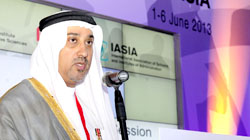

Under the patronage of His Royal Highness Prime Minister Prince Khalifa bin Salman Al Khalifa, the official opening ceremony of the 29th International Conference of Public Administration kicked off today. The 29th edition of the International Conference on Public Administration, being hosted by the Kingdom of Bahrain from June 1 to 6, 2013 and organized by the Bahrain Institute of Public Administration (BIPA) in collaboration with the International Institute of Administrative Sciences (IIAS) and the World Association of Schools and Institutes of Public Administration (IASIA), the largest two organizations specializing in administrative sciences in the world is held under the theme of the “Future of Public Administration: Leadership and Professionalism”.
This international conference is held once every 3 years and is attended by more than 400 participants consisting of an international elite of administrators, academics and practitioners of public administration sciences.
The working papers presented to the conference totaled 322 with 75 from the Middle East alone, of which just 63 have been accepted while the papers submitted by the Kingdom of Bahrain alone amounted to 60, the equivalent of 78% of the total Middle East papers, of which only 49 papers were accepted. For the first time in the history of the conference, 29 working papers will be presented in Arabic after adopting Arabic as a third official language of the conference along with English and French.
On this occasion, BIPA Director Dr. Raed Bin Shams has welcomed on behalf of the Kingdom of Bahrain the participating guests praising the substantial support provided by the wise government in order to ensure the success of this great event. Bin Shams added that Bahrain has succeeded in obtaining the blessing and support of regional and international organizations working in the public administration after BIPA announced the establishment of MEPAR, a Middle Eastern research group specializing in public administration sciences, pointing out that MENPAR is the largest gathering of public administration bodies in the Middle East, and will be one of the most important groups in the region given that the Arab-speaking international organizations concerned with public administration in the Middle East are actually resorted to by the local governments seeking solutions to their public administration issues. He added that the Institute aspires to be an Arab reference in public administration sciences and research.
The annual meeting of IASIA was held yesterday. On this occasion, H.E Shaikha May Bint Mohammad Al Khalifa, Culture Minister, welcomed the participants and stressed the importance of public administration in the development and progress of peoples and communities in the world. For his part, BIPA Director Dr. Raed Bin Shams described IASIA aspirations as compatible with the aspirations and ambitions of the Kingdom of Bahrain on upgrading the public administration in the public sector, and stressed that “work in the future will focus on the exchange of information, ideas, experiences and science of common interest in the areas of public administration, as well as the analysis and study of all the issues of public administration.”
Dr. Sofian Sahrawi, Assistant Director General at BIPA, presented a brief overview of the main theme of the conference: “The Future of Public Administration: Leadership and Professionalism” and said that this issue is important because governments face challenges at all levels of governance. “Moreover, the crises push the leaders in the public sector to re- think the current reforms and find ways to create positive change and development,” he added, stressing that the risks arising from globalization require the protection of peoples' future.
Dr. Khalif Al- Khawaldeh, Minister of Public Sector Development in the Hashemite Kingdom of Jordan also reviewed the Jordanian experience in public administration and pointed out that the changing environment, fast-moving events and renewable data are likely to require a new different look at public administration, stressing the need to maintain a balance between short-term and long-term concerns without prioritizing or delaying.
It is worth mentioning that the opening ceremony and the meetings of the work teams and panel discussions will be held on Monday, the third day of the conference in the presence of all the participants.
The first day witnessed legal meetings of IIAS and IASIA and the second saw major meetings of IIAS Board of Directors and a round-table meeting for the leaders of the International Institute. On the fourth and fifth days, the conference will resume its open sessions and workshops for schools and institutes of public administration before it wraps up its activities on June 6, the last day of this international gathering.
